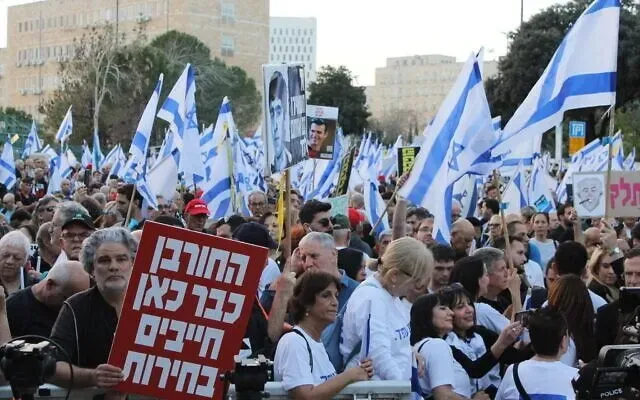Israel saw the largest anti-government protest since the start of the Gaza war
Kyiv • UNN
Tens of thousands of Israelis held protests in Israel.

In Israel, tens of thousands of people turned out for the largest anti-government demonstration since the start of the Gaza war. Those gathered outside the parliament building in Jerusalem called on the government to conclude a ceasefire agreement, release hostages remaining in the hands of Hamas and hold early elections, reports euronews, writes UNN.
Details
Demonstrators are quoted as saying they "blamed Netanyahu for the Oct. 7 setbacks and said deep political divisions over his attempt to reform the judiciary last year had weakened Israel on the eve of the terrorist attack." "Many are unhappy that he has soured relations with the United States, the Jewish state's most important ally," the publication wrote.
Netanyahu is reportedly "also facing numerous corruption charges, and critics believe his decisions are aimed at political survival rather than the national interest." Organizers vowed to continue the demonstration for several days. Thousands of people also took part in a protest in Tel Aviv.
There was a parallel march through the streets of the ultra-Orthodox Mea Shearim neighborhood, organized by the Brothers in Arms, a group composed of reserve soldiers.
The publication points out that most Jewish men are required to serve in the army for about three years, followed by years of reserve service. Jewish women do two years of compulsory military service. "But the politically influential ultra-Orthodox, who make up to 13% of Israeli society, have traditionally received preferential treatment when studying full-time in religious seminaries," the publication says.
The benefits - combined with government scholarships that many seminary students receive until age 26 - have exhausted the public's patience, the publication writes. Long-standing tensions have been exacerbated by nearly six months of war in which more than 500 Israeli soldiers have been killed, the publication notes.
The Supreme Court found the current system discriminatory and gave the government until Monday to submit a new plan and until June 30 to adopt it.
In response, the Israeli Prime Minister said he was doing everything possible to get the hostages back.
"Calls for elections now, in the midst of the war, just before victory, will paralyze Israel for at least six months. I estimate eight months. They will paralyze negotiations for the release of our hostages, they will end the war before its objectives are achieved, and the first to bless such a decision will be Hamas. That says it all," Israeli Prime Minister Benjamin Netanyahu said, while saying.
Netanyahu made the announcement shortly before he was admitted to the hospital: he was diagnosed with a hernia and it was decided not to postpone the surgery, which doctors said was successful. While the 74-year-old Prime Minister is in the hospital, Deputy Prime Minister Yariv Levin is acting as his deputy.
On Sunday, Netanyahu reaffirmed his determination to continue the ground operation in Rafah (which has yet to begin, despite having been discussed for many weeks). At a press conference, he said that the government had approved the IDF's operational plans for an offensive against the city, which is considered the Hamas group's last stronghold.
Netanyahu added that the Israeli military is preparing plans to evacuate Rafah's civilian population. The Israeli prime minister denied speculation that the Rafah operation was being delayed because of U.S. pressure or because of the Muslim holy month of Ramadan.
Supplement
Israeli troops, writes euronews, are fighting in several areas of the Gaza Strip, including the al-Shifa hospital, which has been under siege for two weeks.
Thousands of displaced Palestinians in southern Gaza are suffering from severe lack of clean water and unsanitary conditions. International organizations have sounded the alarm over the growing spread of disease, especially among children. WHO has reported tens of thousands of cases of upper respiratory infections, diarrhea, pediculosis, scabies, chicken pox, skin rashes, and meningitis.
Meanwhile, in the West Bank, a new "technocratic" government was sworn in on Sunday. Mohammad Mustafa became both prime minister and foreign minister. Observers see this as part of the U.S. administration's efforts as part of a "two-state solution." The White House has expressed hope that the new cabinet will also be responsible for the post-war reconstruction of Gaza, although both Israel and Hamas reject the idea.




